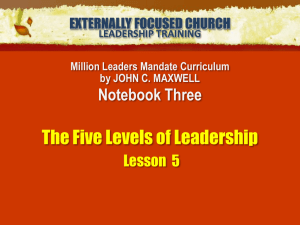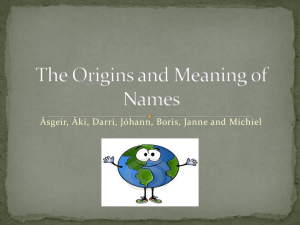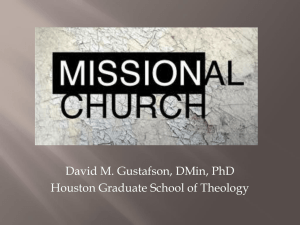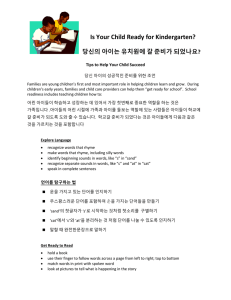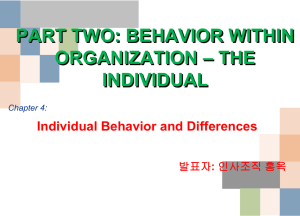Making Sense of Biblical Community
advertisement
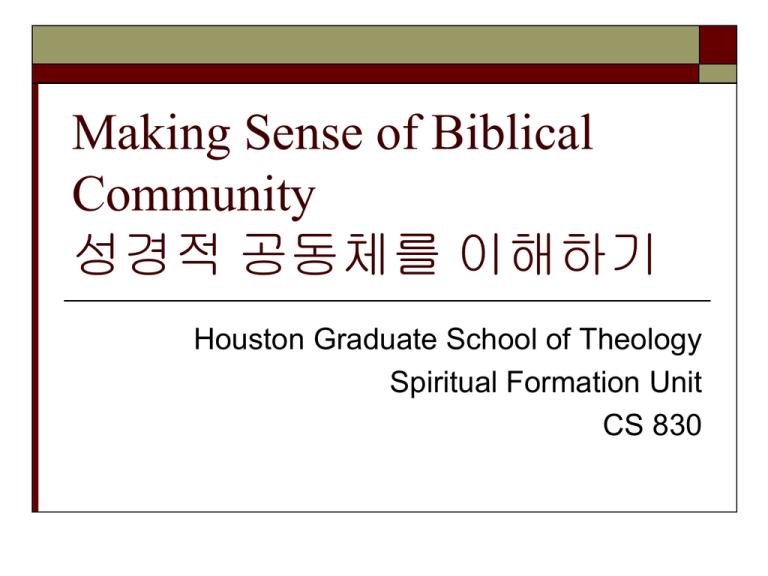
Making Sense of Biblical Community 성경적 공동체를 이해하기 Houston Graduate School of Theology Spiritual Formation Unit CS 830 True community begins with a biblical understanding of love Longsuffering – what love is인고-사랑이란 Greek meaning is “patience” or the act of bearing with someone.헬라어의 의미로는 인내나 어떤 사람에 대해 참는 행동이다. OT – Describes God구약-하나님을 묘사한다. Ex 34:5-7 Ps 103:8-13 Jonah 4:2 NT – Since God has been patient with us, we should be patient with one another (see Gal 5:22).신약-하나님이 우리를 참으셨기에 우리도 서로를 참아야 한다. Biblical love (contd.)성경적 사랑 Descriptions of “longsuffering” in the negative sense부정적인 의미에서 “인고”의 서술 Love is not easily provoked or not easily drawn into anger.사랑은 쉽게 화내지 않고 쉽게 화에 빠지지 않는다. Love thinks no evil.사랑은 악한 것을 생각하지 않는다. Love is not envious.사랑은 질투하지 않는다. Biblical love (contd.)성경적인 사랑 Kind – what love does친절-사랑이 하는 것 OT – Describes God and is usually partnered with “longsuffering.”구약-하나님을 서술하고 “인고”와 항상 동반한다. NT – Believers are to love as God loves. Therefore, believers are to be kind and bear the stamp of the Holy Spirit by displaying kindness as a fruit of the Spirit’s presence. 신약-신자는 하나님이 사랑하신 것처럼 사랑해야 한다.그러므로 신자는 친절해야 하고 성령의 임재의 열매로써 친절을 나타냄으로 성령의 인을 가져야 한다. Gal 5:16-25 Eph 4:29-32 Biblical love (contd.)성경적인 사랑 Descriptions of “kindness” in the negative sense부정적인 의미의 “친절”에 대한 서술 Love is not boastful, proud, or arrogant.사랑은 자랑하지 않고 교만하지 않는다. Boasting – intellectual pride emphasized through speech자랑말을 통하여 강조된 지적 자만 Arrogance – action or the way boasting comes across거만자랑이 만나는 행동이나 방법 Pride – seeks to build itself up by tearing others down자만-남을 손상함으로 자신이 높아지기를 구하는 것 Love is not rude.사랑은 무례하지 않다. Love is not self-seeking.사랑은 자신의 유익을 구하지 않는다. Foundations of biblical community성경적 공동체의 기초들 Marion K. Rich – The early Christians were often together around the teachings of Christ—the word, prayer, the sacraments. They were together to share their common life in Jesus. Somehow we need to rediscover the life the early Christians shared together—the kind of fellowship that gets deeper than football scores and the latest fashions.마리온 케이 리치-초대교인들은 예수님의 가르침인 말씀,기도,성례에 자주 함께 모였다. 그들은 예수안에서 일상생활을 함께 나누었다. 어쨌든 우리는 미식축구 점수나 최신 유행에 대한 나눔이아니라 초대교인들의 깊은 나눔을 다시 회복해야 한다. Foundations of biblical community성경적 공동체의 기초들 Albert J. Wollen – In 1965, Dr. Francis Schaeffer made the following comment about the future of the church: “Unless the church changes its forms and gets back to community and sharing of lives personally, the church is done.”알버트 제이 울렌1965년에 프란시스 쉐퍼박사는 교회의 미래에 대하여 아래의 논평을 했다. “만약 교회가 형태를 바꾸지 않거나 공동체로 돌아가지 않거나 개인적으로 삶을 나누지 않는다면 교회는 끝난 것이다.” Foundations of biblical community성경적 공동체의 기초들 Larry Crabb – A central task of community is to become a place safe enough for each of us to own our brokenness. Only then can the power of connecting do its job. Only then can community be used of God to restore our souls.레리 크랩공동체의 중심적인 일은 우리 각자가 자신의 부서짐을 소유할 수 있게 충분히 안전한 장소가 되어야 한다. 그런후에야 연결하는 힘을 발휘할 수있다. 또 그런 후에야 하나님이 우리의 영혼을 회복시키는데 공동체가 쓰임을 받을 수있다. Foundations of biblical community성경적 공동체의 기초들 Gilbert Bilezikian – Community is deeply grounded in the nature of God. It flows from who God is. Because he is community, he creates community. It is his gift of himself to humans.길버트 빌리즈키안공동체는 하나님의속성에 깊이 근거되어 있다. 그것은 하나님이 어떤 분인가로 부터 나온다. 왜냐하면 하나님은 공동체이시고 또 공동체를 만드시기 때문이다. 그것은 인간에 대한 하나님 자신의 선물이다. Community was promised and planned for in the OT with the development of a nation.공동체는 나라의 발전과 함께 구약에서 약속되고 계획된 것이다. Foundations of biblical community성경적 공동체의 기초들 Community was restored in Jesus.공동체는 예수안에서 회복된다. Les Steele – By gathering followers around him, Jesus implicitly affirmed that participating in community plays a central role in maturing.리스 스틸리-예수님은 자신의 주위에 따르는 사람들을 모으심으로 공동체에 참여하는 것이 성숙에 중심적인 역할을 하는 것임을 확인하셨다. Community in the NT – the “one anothers.”신약에서의 공동체-서로 서로 Spiritual vs. Unspiritual Community영적 대 비영적 공동체 Conflicted relationships met by Spiritual Friendships (Care of the Soul)영적우정(영혼의 돌봄)에 의해 만난 충돌된 관계 Conflicted relationships handled by Congenial Relationships, Cooperative Relationships, and Consoling Relationships.동지적 관계와 협력적 관계와 위로의 관계에의해 다루어진 충돌된 관계 Spiritual vs. Unspiritual Community영적 대 비영적 공동체 And, as needed, Spiritual Direction (Cure of the Soul)그리고 필요한 것처럼, 영적 방향(영혼의 치료) And, as needed, Counseling Relationships or Conforming Relationships 그리고 필요한 것처럼, 상담적 관계들 혹은 일치적 관계들 Spiritual vs. Unspiritual Community영적 대 비영적 공동체 Characterized by Dependence on the Spirit (Listening to God through word and spirit)성령을 의존함에 묘사되어진다.(말씀 과 성령을 통해 하나님께 듣는 것) Characterized by Dependence on the Flesh 육신을 의존함에 묘사되어 진다. Barriers to Community 공동체의 장애물들 Antonyms of Community 공동체의 반의어 Disparity불균형 Difference차이 Dissimilarity같지 않음 Disagreement불일치 Conflict충돌 Private/Personal사적인/개 인적인 Individual개개의 Synonyms of Community 공동체의 동의어 Nurtured양육된 Nourished영양을 준 Sustained유지된 Strengthened강화된 Educated교육받은 Discipled훈련된 Corporate연합의 Barriers to Community공동체의 장애물들 But where do we find the biggest barriers to community?그러나 우리는 공동체의 가장 큰 장애물들을 어디에서 찾는가? INSIDE OURSELVES!우리 자신들 안에서! What are our tendencies when trying to make things better in our churches, homes, lives?우리가 우리 교회, 집들, 삶의 것들을 더 낫게하기 위해 노력할 때 우리의 성향들은 무엇인가? We want spiritual community! Why don’t we get it?우리는 영적인 공동체를 원한다! 왜우리는 그것을 얻지 못하는가? How can we incorporate the principles of biblical love with our desires for community? 우리는 공동체를 위한 우리의 바람과 함께 성경적 사랑의 원리들을 어떻게 통합할 수 있나? A Story of Brokenness 부서짐의 이야기 Family Systems Thinking 가족 제도 사고 Personal Transformation 개인적 변화 Happens best as an inside-out process of committing to obey Christ. 그리스도께 복종하는 일에 헌신하고 안에서 밖으로 바뀌는 과정에서 최고로 일어 난다. Happens best in the context of a loving community that extends grace and truth.은혜와 진리를 확장하는 사랑의 공동체의 배경에서 최고로 일어 난다. Happens best when we develop a reflective lifestyle. 우리가 반성하는 삶의 방식을 개발할 때 최고로 일어 난다 Family Systems Thinking 가족 체계 사고 Differentiation of Self 자신에 대한 소원 The ability to know who we are apart from others. 다른 사람과 떨어져 있는 자신을 아는 능력. The effort to define oneself, to control oneself, to become a more responsible person, and to permit others to be themselves as well.자신을 정의하고 자신을 통제하고 더 책임있는 사람이 되는, 그리고 다른사람을 다른 사람으로 인정하는 노력. The ability to remain connected in relationship to significant people in our lives and yet not have our reactions and behavior determined by them.우리의 삶에 영향력있는 사람과의 연결된 관계를 유지하고 그들에 의해서 우리의 반응과 행동이 결정되지 않는 능력. Family Systems Thinking 가족 체계 사고 Anxiety 염려 Anxiety, most simply described, is our response to threat, whether real or perceived. 염려는 단순히 말한다면 실제적이거나 인식된 위협에 대한 우리의 반응이다. Acute vs. chronic (reactivity). 급성 대 만성(반응) Chronic anxiety or reactivity is usually a result of a perceived threat to hidden needs. 만성적 염려나 반응은 주로 숨겨진 필요들에 대한 인식된 위협에 대한 결과이다. Usually, a person will discover through this process three or four general needs he or she attempts to meet on a regular basis. 주로 사람은 이런 과정을 통하여 일반적인 기준을 맞추는 세가지 혹은 네가지 일반적인 필요들을 발견한다. Family Systems Thinking 가족 체계 사고 Chronic anxiety is most evident during times of:만성적 염려는 이런 때에 가장 명백하다. Conflict 충돌 Distancing or cut-off 멀어짐 혹은 절단 Overfunctioning/underfunctioning 과도한 기능/약한 기능 Projection (making someone or something the problem 투사(사람이나 사물에게 문제를 만드는 것) The Dance Goes On 춤은 계속 된다 Although each response keeps the anxiety spill contained in one place, each also contributes systemically to the level of anxiety in the system. We are anxious, we react, and we produce a symptom. We become more anxious because of the presence of the symptom. The dance goes on. 그렇지만 각각의반응이 염려를 한 장소에 모이게 하고 각각은 또한 체계안에 있는 염려의 단계에 대하여 체계적으로 일한다. 우리는 염려하고 반응하고 증상을 낳는다. 우리는 증상이 실재로 나타나기에 더 염려하게 된다. 춤은 계속 된다. --The Leader’s Journey, 58 Family Systems Thinking 가족 체계 사고 An Anxious System염려 체계 Heightened level of reactivity – people confuse feelings with opinions – everything seems dire and serious. 반응의 고조된 단계-사람은 의견들과 감정들을 혼동한다-모든것들이 긴박하고 심각하게 보인다. Herding instinct – the greater the level of anxiety, the more we pressure one another to be the same, think the same, and conform. 군거 본능-염려의 단계가 커질 수록 같이 되거나 같이 생각하거나 일치하도록 서로에게 압력을 더 넣는다. Family Systems Thinking 가족 체계 사고 An Anxious System염려 체계 Blame displacement – the tendency to look outward for explanations rather than inward. 비난 대체-설명을 위해 안쪽을 보기보다 바깥을 보는 경향. Quick fix – the focus is on eliminating the symptoms rather than on dealing with those underlying emotional processes keeping the symptoms alive. 급한 정정-증상이 살도록 하는 저변에 흐르는 감정적인 과정들을 처리하는 것보다 증상을 없애기 위한 일에 촛점을 맞춤. Poor leadership – the lack of a leader who operates with clear vision and thoughtfully-held principles. 빈약한 지도력-분명한 비젼과 전반적인 원리로 움직이는 지도자의 결핍. Family Systems Thinking 가족 사고 체계 Become less anxious 덜 염려하기 위해서 Increase self-awareness – recognize underlying needs and allow God to replace those needs with his characteristics. 자기 인식의 증진저변의 필요를 인식하고 하나님으로 하여금 그런 필요들을 그의 성품으로 대체하도록 허용한다. Monitor thinking patterns – take time to recognize how anxiety feels and when it is in operation. 사고형들을 감시-시간을 두고 어떻게 염려를 느끼는가 언제 그것이 작동하는가를 알아낸다. Manage feelings – wait before reacting. 감정 관리-반응하기 전에 기다린다. Slow the pace – take a step back to observe and think. 속도를 줄임한걸음 뒤로 물러 나서 관찰하고 생각한다. The Process of Transformation 변화의 과정 When recognizing patterns or tendencies of behavior, invite the presence of Christ into the scenario to reveal the source. 행동의 형이나 경향을 인식할 때 그 근원을 드러내기 위하여 그리스도의 임재를 초청하라 Ask Christ to reveal the needs you are attempting to meet on your own and, possibly, the source of those needs.당신이 맞추려고 하는 필요를 그리스도로 하여금 드러내어 달라고 요청하고 가능하다면 그 필요의 근원도 드러내어 달라고 구하라. Dialogue about your discoveries with someone you trust (spiritual friend/director). 당신의 발견한 것을 믿을 만한 사람과 대화하라. (영적 친구/지도자) Transformational Goals Worksheet 변화목적 연습장 Answer the six questions with the help of a spiritual director (or more than one). 한사람이나 그 이상의 영적 지도자의도움으로 여섯 문제에 답하라. Surprise! You may use first person pronouns on the worksheet, only in response to the questions. 놀랍게도 당신은 그 질문들을 대답할 때 일인칭 대명사를 사용할 수 있다. Instead of a “conclusion,” please write a one-page reflection on the process (IN ENGLISH) and please return to third person writing for the one-page paper. 결론 대신에 한 페이지의 반성을 쓰십시요 그 페이지는 삼인칭으로 쓰십시요.
